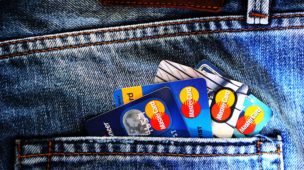Reading time: 6 minutes
This post may contain affiliate links. If you click these links and purchase something we may earn a commission. This helps us provide the information here free of charge to you. Continue Reading.

Are you looking for the best way to get out of debt? If so, you are not alone. Carrying debt can leave you feeling chained because you basically are. The good news is, getting out of debt is possible, even if you have no assets, no money, and no idea how to begin. There is a lot of cookie-cutter financial advice out there: make coffee at home, eat out less, cut up your credit cards, earn more money, etc. These kinds of tips are obvious and may not even be very helpful. So, before you try them, it is recommended that you explore the following realistic strategies on how to get out of debt quickly.
1-Track Your Spending
Tracking your spending down to the last penny is one of the first things you can do to improve your chances of success. It is extremely important to know where your money is going. This means tracking your monthly payments and recurring bills for items like entertainment, insurances, housing, transportation, food, credit card payments, utilities, and anything else that is a regular outgoing expense. There are many tools that you can use for this purpose, e.g. Financial Planner, QuickBooks, Mint, Wally, etc. With this strategy, you will identify areas where you can get rid of unnecessary expenses. This will eventually free up funds that you can then use to get out of debt. Your goal is to find the best way to get out of debt, this may be the most important step to help you achieve that goal.
2-Build a Debt Repayment Plan
Build a plan for dealing with your debt and do it as early as possible. There are a number of key methods to repaying the debt that you may want to consider. Each method has its own advantages. You will want to understand where your money is going by the time you are ready to build your debt repayment plan. Using reliable spreadsheet tools such as Microsoft Excel or Google Sheets will help you dial in your repayment plan. You can use them to track your income, spending, and expenses.
Following are the key repayment strategies you should consider:
Debt Snowball
Debt Snowball is a popular debt repayment strategy. Basically, this method is all about paying the smallest balance first and then focusing on the next smallest balance in line. Following are the steps to apply the Debt Snowball method:
- Create a list of all your debts and sort them from smallest to largest balance.
- Keep paying the smallest amounts due on all accounts except the smallest balanced account.
- Pay on the smallest account via all your available funds.
- Continue to do so until you have paid all of your accounts in full. To avoid having to repeat the process, shut down all spending on any credit cards.
Debt Avalanche
With this method, your goal is to pay off the accounts with the highest interest rates first. The steps are similar to that of Debt Snowball method with the key difference that you focus on the highest interest rates rather than the smallest balances. This method is known to save money on interest payments and it is generally helpful for individuals who want to pay off high balances first.
Debt Landslide
With this method, you focus on paying off your most recent accounts first. The steps are the same as Debt Snowball method, but your focus here is your latest accounts rather than the smallest balances.
Since credit scores predict future credit behavior on the basis of recent past credit behavior, Debt Landslide method tends to build/rebuild your credit faster. It can be helpful for those who are trying to put their finances in order to clean up their credit, apply for a new job, etc.

3-Put Financial Windfalls to Work
A financial windfall is a sum of money that comes from an unpredicted source, e.g. lottery, prize winnings, inheritance, etc., or an anticipated windfall through one-time work bonuses, tax returns, high-value sales, etc. You can use these funds to pay off your debt and hence take a large bite out of your total debt owed. It helps shorten your repayment time frame significantly.
4-Negotiate Debt Settlement with Your Creditors
When you are behind payments and your unsecured debt becomes too much to handle, you may consider negotiating debt settlement with your debt collector or creditor. Just like your credit card company, your creditor may agree to set you up on a payment plan, settle your debt for less than what’s owed, or simply reduce monthly payments. Here are some tips for settling your debt:
- Take Notes: Write down the name of the person you talked to, when you called and what they said. You can use this information in a follow-up email.
- Get it in Writing: Before making any payments, get your proposed debt settlement or repayment plan in writing.
- Be Honest: Explain your financial situation to the creditor. If you cannot keep up with the monthly payments, then don’t commit to a debt repayment plan.
- Check the Statue of Limitations: You cannot be sued over a debt if it is time-barred. However, the debt is still owed and it will show up on your credit report.
5-Consider Debt Consolidation
Debt consolidation can help you repay your debt at a lower interest rate. This method of repayment also allows you to combine multiple debts into one. This means you can make just one monthly payment rather than multiple payments. Personal loans and credit cards are popular ways of consolidating debt.
Conclusion – Start Now
Every journey begins with a single step. Every little bit counts when paying off debt, and there is no way to make progress without taking the first step. Find the plan that works for you and take action. The sooner you are debt-free, the sooner you can have financial stability and then you can start building wealth that you have always wanted.
Getting out of debt is a difficult task, so it is important that you build better habits going forward so that you can avoid getting yourself in the same situation again. Stay out of debt by tracking your spending, building your savings, and finding ways to increase your income.









